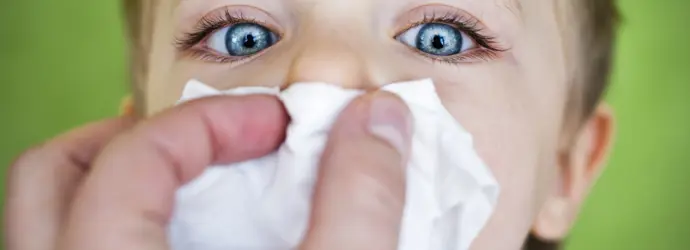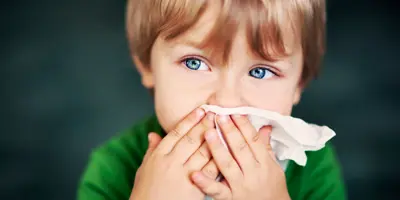9 people found this helpful

Nosebleeds aren’t usually a serious health condition, but they can cause a bit of a panic – and mess! We’ll explain what causes nosebleeds, the link between nosebleeds and colds, and how to prevent them.
What causes nosebleeds?
There are various reasons for an anterior nosebleed (coming from the front of the nose). This is when very small blood vessels in your nose break and bleed. Some of the most common reasons for this include:
- Blowing your nose too hard.
- Picking your nose.
- The inside of your nose being too dry, which can be down to air temperature.
- Allergic reaction.
- A foreign object being pushed in your nostril.
Certain reasons for nose bleeding might require medical attention. This is typically when the nosebleed is coming from deeper inside the nose (posterior nosebleed), which can be down to:
- High blood pressure.
- A broken nose or injury.
- Blood-thinning medicines, like warfarin.
- Conditions that affect blood clotting or blood vessels.
Whatever is causing your nosebleed, use soft Cushelle Regular Tissues to stem the flow. They’re gentle on your skin while being strong enough to hold the blood. Keep a box of tissues at hand so it’ll be easy to grab one in any room.
Nosebleeds and colds: what’s the link?
Have you ever been suffering from a stuffy cold and then found yourself scrabbling for a tissue to keep a sudden nosebleed at bay? You’re not alone! Nosebleeds and colds can go hand in hand sometimes – here’s why:
Colds can irritate the lining of the nose, and powerful sneezes can rupture the blood vessels. You typically blow your nose a lot when you have a cold too, causing further irritation. Plus, the air is also drier during colder months (when colds are most common) and dry air tends to dry out nasal membranes, which can cause itchy crusts that bleed when scratched. These factors can all add up to a nosebleed.
If you’re a sufferer of frequent colds, the blood vessels inside the nose might become so irritated that they don’t heal, resulting in frequent nosebleeds. If you keep having a nosebleed after a cold, speak with your doctor about possible treatments. We also recommend to always keep Cushelle Protect Pocket Pack tissues with you to protect the outside of your nose from excessive blowing and to catch any blood in case of a nosebleed. Teaching your children how to correctly blow their nose to prevent the risk of nosebleeds is also extremely important, so check out our nose-blowing guide for kiddies for more information.
Can high blood pressure cause nosebleeds?
A high blood pressure crisis, also called hypertensive crisis, happens when there is a sudden spike in your blood pressure (over 180/120 mm Hg). This can often lead to nosebleeds as the blood vessels in your nose can get damaged.
Other common symptoms include:
- Headaches
- Severe anxiety
- Dizziness
- Shortness of breath
- Chest pain
If you experience any of the above then we recommend seeking medical advice immediately as hypertensive crisis can be life-threatening.
How to prevent nosebleeds: our top tips
It’s always better to be safe than sorry, and the same applies to nosebleeds. We’ve put together a list of easy ways to prevent nosebleeds for your peace of mind:
- Use a humidifier to always keep the air in your house moist.
- Avoid going hunting for boogies – don’t pick your nose.
- Limit your intake of aspirin, as it can thin your blood and contribute to nosebleeds. However, make sure to discuss this with your doctor first because the benefits of taking aspirin might outweigh the risks.
- Don’t abuse antihistamines and decongestants as they can dry out the nose.
- We recommend using a saline spray or gel to keep the nasal passages moist. For the gel, use a cotton swab and gently spread a thin layer inside the nostril three times a day.
- Avoid smoking if you can as it might irritate the inside of your nose and dry it out.
If you still find yourself having frequent nosebleeds then why not check out our guide on how to stop them and when to seek medical advice? Luckily, now that you know what causes them and why you might experience nose bleeding during a cold, it will be easier to prevent them from happening.
You might also want to check out our guide on how to boost your immune system to arm yourself with tips on fighting off colds (and consequently nosebleeds all together!).
Related articles
5 Ways to Deal With Dust Allergies
If you think you have a house dust allergy, this article contains five dust allergy remedies to help you manage your symptoms. Click to read more.

5 natural and herbal remedies for hay fever to try at home
Want to know how to treat a pollen allergy at home? Discover five options, from herbal teas and steaming to herbal remedies for hay fever relief, here.

4 tips for unblocking a newborn’s nose
Learn how to blow a baby's nose and how to teach nose blowing to older children with this guide on how to clean baby nose blockages.

How to blow your nose: 5 nose blowing tips for parents and kids
Teaching kids to blow their nose can be a challenge. Follow our useful kid-friendly guide for some handy tips and techniques on how to blow a child's nose.

How to stop a runny nose: why do we get runny noses and 5 ways to stop them for good
Find out how to stop a runny nose naturally. Discover our top tips, and natural and herbal remedies for a runny nose to stem the flow more quickly, here.

The truth behind hay fever causes: hay fever myths debunked
What causes hay fever? We debunk the myths surrounding hay fever triggers and answer common questions like is hay fever contagious? Find the answers here.



